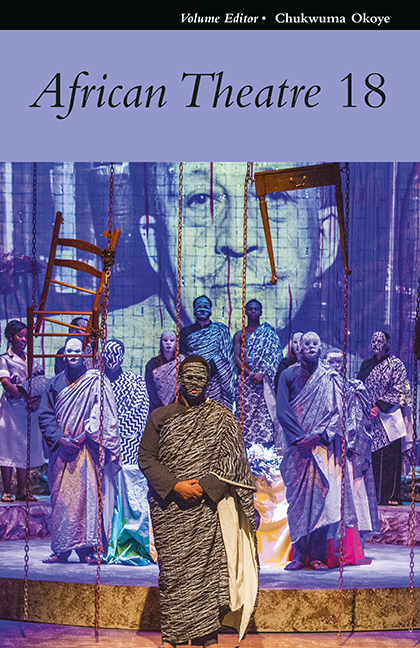Tiziana Morosetti (ed.), Africa on the Contemporary London Stage
Published online by Cambridge University Press: 02 April 2020
Summary
Africa has long been re/presented on the London stage; from stories of bizarre Georgian caricatures exemplified by Sartjee Baartman, the infamous ‘Hottentot Venus’, who ‘gained some notoriety in London in 1810 to 1811 as a popular performer’ (Lindfors 2014: 36, University of Wisconsin Press), to Ira Aldridge, whose 1833 appearance as William Shakespeare's Othello on the Covent Garden stage was as remarkable as it was unprecedented. Africa on the Contemporary London Stage offers a much more contemporary account of the re/presentation of Africa on the London stage from the 1950s to the present. Even though the title of the book appears to impress upon the reader that its contents will involve a Pan-African exploration, its focus is mainly on the works of playwrights, theatre companies and practitioners from a Nigerian background or heritage, and the place they occupy on the London stage. More so, the volume does not explore works by African-Caribbean playwrights or black British theatre more generally, due to what it considers the ‘mainstream recognition’ enjoyed by black British theatre in the twenty-first century, and ‘[t] he new millennial prominence of British Nigerian cultural presences on the stage’ (4). As such, the introductory chapter by Morosetti serves as a useful entrée to the volume and sets the context for the unfolding discourse presented in the subsequent chapters.
In examining the theatre practitioners and companies that represent the British-Nigerian presence on the London stage, Africa on the Contemporary London Stage ‘discusses whether the Africa that emerges from the London scene is stereotypical, or whether it has, on the contrary, contributed to an understanding of the continent and its arts’ (2). The book is divided into two broad parts, with a total of thirteen chapters. Part I and Part II are each made up of six chapters and are suitably framed by the introductory chapter. Part I is subtitled ‘Africa on the London Stage, 1955–2013’ and features a range of voices starting with James Gibbs’ chapter, ‘Freedom, London 1955: A Story of Modern Africa Written and Acted by Africans, or Perhaps Not’. Relying on the archival research he undertook for the chapter, Gibbs argues that Freedom, which was staged at the Westminster Theatre during August 1955 by a group of African actors, cannot in fact be seen as ‘a story of modern Africa written and acted by Africans’ (36).
- Type
- Chapter
- Information
- African Theatre 18 , pp. 176 - 180Publisher: Boydell & BrewerPrint publication year: 2019



